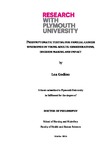PRESYMPTOMATIC TESTING FOR FAMILIAL CANCER SYNDROMES IN YOUNG ADULTS: CONSIDERATIONS, DECISION MAKING AND IMPACT
| dc.contributor.supervisor | Skirton, Heather | |
| dc.contributor.author | Godino, Lea | |
| dc.contributor.other | Faculty of Health | en_US |
| dc.date.accessioned | 2017-03-16T11:23:49Z | |
| dc.date.issued | 2017 | |
| dc.identifier | 10390784 | en_US |
| dc.identifier.uri | http://hdl.handle.net/10026.1/8643 | |
| dc.description | Godino L, Turchetti D, Jackson L, Hennessy C, Skirton H. (2016) Impact of presymptomatic genetic testing on young adults: a systematic review. European Journal of Human Genetics. 24:496-503. doi: 10.1038/ejhg.2015.153. E-pub 2015. | en_US |
| dc.description.abstract |
Background: Presymptomatic genetic testing should always involve a considered choice. Young adults are at a key life stage as they may be developing a career, forming partnerships and potentially becoming parents. Presymptomatic testing may therefore affect the future lives of consultands significantly when testing is undertaken in early adulthood. Aim: To explore presymptomatic testing for hereditary cancer in consultands aged 18-30 years with particular reference to psychosocial impact, the decision-making process and the consequent counselling needs. Methods: A mixed-methods sequential exploratory design was used, comprising a systematic review, a qualitative study and a quantitative study. Results of all phases were used to build a theoretical model regarding the process of presymptomatic testing in young adults. Findings: The systematic review indicated that many participants grew-up with little or no information concerning their genetic risk. The experience of genetic counselling was either reported as an opportunity for discussing problems or associated with feelings of disempowerment. Parents appeared to have exerted pressure on their children during the decision-making process. However, as a result of the qualitative study, the influence of other people and the decision-making process prior to counselling were identified as key factors. Further results from the quantitative phase underlined that parents felt they had control over the decisions their children made, while the majority of the young adults reported the request for the genetic test as their own decision. A new theoretical model of decision making and impact on young adults was built to synthesise the overarching experience of participants in this research project. Conclusion: Counselling approaches to this population may require modification both for young adults and their parents. Young adults may benefit from a multi-step approach to presymptomatic testing. Parents need to be more informed that genetic counselling is a forum where information can be obtained and young adults can talk about the testing decision, regardless of whether they want to be tested or not. The traditional ‘wait until they come to us’ approach by health services may be failing to meet the educational and emotional needs of this population. | en_US |
| dc.language.iso | en | |
| dc.publisher | University of Plymouth | |
| dc.rights | Attribution-NonCommercial-NoDerivs 3.0 United States | * |
| dc.rights.uri | http://creativecommons.org/licenses/by-nc-nd/3.0/us/ | * |
| dc.subject | genetic counselling | en_US |
| dc.subject | young adults | en_US |
| dc.subject | presymptomatic genetic test | en_US |
| dc.subject | Mixed-methods | en_US |
| dc.subject.classification | PhD | en_US |
| dc.title | PRESYMPTOMATIC TESTING FOR FAMILIAL CANCER SYNDROMES IN YOUNG ADULTS: CONSIDERATIONS, DECISION MAKING AND IMPACT | en_US |
| dc.type | Thesis | |
| plymouth.version | publishable | en_US |
| dc.identifier.doi | http://dx.doi.org/10.24382/810 | |
| dc.rights.embargodate | 2018-03-16T11:23:49Z | |
| dc.rights.embargoperiod | 12 months | en_US |
| dc.type.qualification | Doctorate | en_US |
| rioxxterms.version | NA | |
| plymouth.orcid.id | orcid.org/0000-0002-3763-9372 | en_US |
Files in this item
This item appears in the following Collection(s)
-
01 Research Theses Main Collection
Research Theses Main



